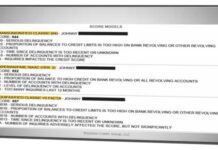Vehicle repossessions can be very damaging to your credit. Whether voluntary or involuntary, repossessions can murder your credit score, and always remember, that just because the action was taken on your credit and it was accurate does not mean that consumer protection laws were followed and/or the account was lawfully reported.
Be sure to gather all documents regarding the repossessed vehicle, including the following:
- the original retail installment sales agreement for the lease or purchase of a vehicle,
- all loan payment details and records,
- all repair or service receipts,
- and all documents and correspondences from the dealer or lender.
You will need these documents to take legal action or to defend yourself against legal action.
Lenders can not disturb the peace during repossessing the vehicle and to determine to disturb the peace, the courts will also examine the circumstances surrounding the actual capture of the vehicle. For instance —whether the owner was physically present, whether the repossessing company entered the property of the owner without their will, and/or was the use of force or violent threats used to repossession the vehicle. The lenders and repossessions companies will be liable for damages in the event a breach of peace took place.
Lenders are not allowed to violate Military Service Protection. A lender can not repossess the vehicle of an active duty service member without court approval. If they do, they could be subject to civil and criminal charges.
Repossessions claims
Improper calculation of deficiency balances is a common theme in the world of car repossessions. It is important that you gather all documents, contracts, and loan payment history to ensure the lender properly calculated any claims against you, such as:
- Interest Rate: Does it match what the lender is legally allowed to charge under the laws of your state?
- Late Fees and Charges: Do any lender fees match the original agreement? Are they accurate late charges?
- Payments and Credits: Did the lender properly credit you for all payments made as agreed?
- Attorney Fees: Does your agreement allow the lender to pass attorney fees onto you? Does your state allow them to pass these fees as part of the deficiency balance?
- Repo and Storage Fees: Repossessions and storage fees disclosed in your original agreement? Each state places limits on these fees but not all states allow this and even have different limits.
It’s possible that a creditor won’t be able to collect a deficient balance at all. This is typically the case if the lender failed to provide required – written notices, failed to conduct the sale of the car in a commercially reasonable manner, or refused to allow you an opportunity to reinstate the loan. If you happened to include the car debt in a bankruptcy they may also be barred from collecting on the deficiency balance.
Lenders must legally provide certain notices following the repossession of a vehicle. The first notice is with respect to redemption and the second is regarding the deficiency balance.
Following the repossessions of the vehicle;
A Notice of Sale is issued when you do not make an attempt to recover your car before it is sold at auction or otherwise, Most states afford consumers a right to cure, which gives the opportunity to bring the account current and get their vehicle back. In most states, lenders must provide the notice of sale at least 10 days prior to the sale of the car — giving you a reasonable amount of time to bring the loan current or pay off the loan and repossession fees to get the vehicle back. If the lender does not provide this required notice a court may deem the deficiency balance noncollectable.
The second required notice following the sale of the vehicle is a statement regarding the deficiency balance. This notice must include the amount the lender credited you with the proceeds of the sale, and a notification of cancellation of the original sales agreement. At wholesale auctions. Repossessed vehicles are sold well below the market resale value. Sometimes, your vehicle gets sold at an auction for less than market value and then can sue to recover the difference between the resale price and fair and reasonable market value.
Lenders and car dealers are needs to conform with the Uniform Commercial Code, Consumer Fraud Act, Truth in Lending Act, and Retail Installment Sales Act. The below letters will reference these statutes.
As Always… In case you haven’t yet.
Step 1:
Tap or click here to get your $1 credit report.
We’ll need it to do your credit analysis.
Note:
This is for a $1 7-day trial.
You can cancel it in the first 7 days if you want but we need this as a first step, in order to help you.
Step 2:
You will get a login and password for IdentityIQ when you set up your $1 trial.
Go to this page on TheCreditMovement.com.
Share your username/password for IdentityIQ in the form on the page.






















